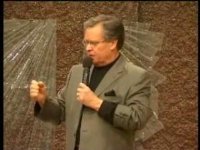Avoiding Spiritual Dangers and Pitfalls: an interview with Eddie Hyatt
The last days will be characterized by a world-wide outpouring of the Holy Spirit, and by wide-spread deception.
Larry Russi: If the Lord tarries, where do you see the Pentecostal/charismatic churches in the next 5-10 years?
 Eddie Hyatt: I see the Pentecostal/charismatic movement continuing to expand globally, especially in South America, Asia and Africa, but having to deal with the same extremes in doctrine and practice that are delineated in the book. Ideally, in the days ahead, the older Pentecostal churches will sincerely seek God for spiritual renewal in their midst and the new emerging charismatic churches will be willing to sit down and learn from Scripture and from those who have preceded them.
Eddie Hyatt: I see the Pentecostal/charismatic movement continuing to expand globally, especially in South America, Asia and Africa, but having to deal with the same extremes in doctrine and practice that are delineated in the book. Ideally, in the days ahead, the older Pentecostal churches will sincerely seek God for spiritual renewal in their midst and the new emerging charismatic churches will be willing to sit down and learn from Scripture and from those who have preceded them.
Larry Russi: Chapter 12 is entitled 5 Reasons I Do Not Practice Contemplative Prayer. Many believers subscribe to this form of meditation. Do you feel that Christians who practice contemplative prayer are being deceived? What, if any, are the dangers in this practice?
Eddie Hyatt: Contemplative prayer tends to be anthropocentric and self-serving in that it is used to seek an experience for the practitioner rather than seeking to know the Lord and His will. The emphasis is on techniques and postures rather than honest, heart-felt communication with the Lord. As I show in the book, contemplative prayer was brought into the church in the Middle Ages by a Syrian monk who falsely claimed to be Dionysius, Paul’s convert/disciple in Athens. His claim has been rejected by both Catholic and Protestant scholars, but the form of prayer he introduced has remained. Neither Jesus nor any New Testament writer taught contemplative prayer as it is taught today.
I once attended a charismatic week-end spiritual retreat where everyone was required to take a vow of silence and the medieval mystics were held up as models of spirituality we should follow. I came away with a deep and profound sense that what I had encountered was a substitute for the spirituality of the New Testament, which is centered in a baptism in the Holy Spirit for service and meant to empower the believer to be the Lord’s witness to the ends of the earth (Acts 1:8).
Larry Russi: How does contemplative prayer differ from meditating on God’s word?
Eddie Hyatt: The goal of contemplative prayer is a spiritual/mystical experience. In contemplative prayer the mind must be cleared and “centered” for such an experience. For the believer meditating on God’s word, the goal is not to have a mystical experience, but to be settled, grounded and transformed by the truth of God’s word. They may have a mystical experience, but that is not their goal. Their goal is to know Him through His word so they can then be more effective in making Him known to others. This is important, for the greatest revelation of Christ is to be found, not in a mystical experience, but in God’s word. Jesus made this plain when in His post-resurrection appearance to the two disciples on the Emmaus Road, he spent the entire time (probably around two hours) taking them from Genesis to Malachi and expounding to them in all the Scripture the things concerning Himself (Luke 24:27).
Category: Spirit, Summer 2019


